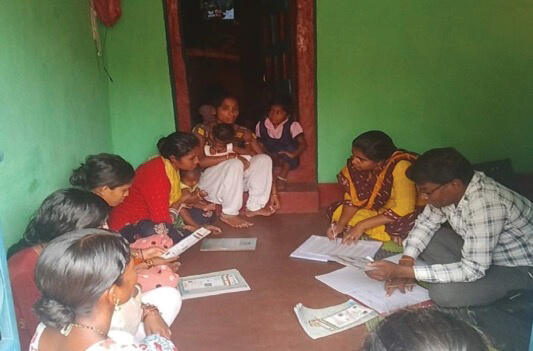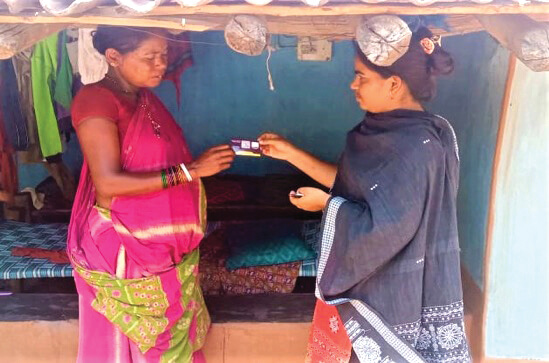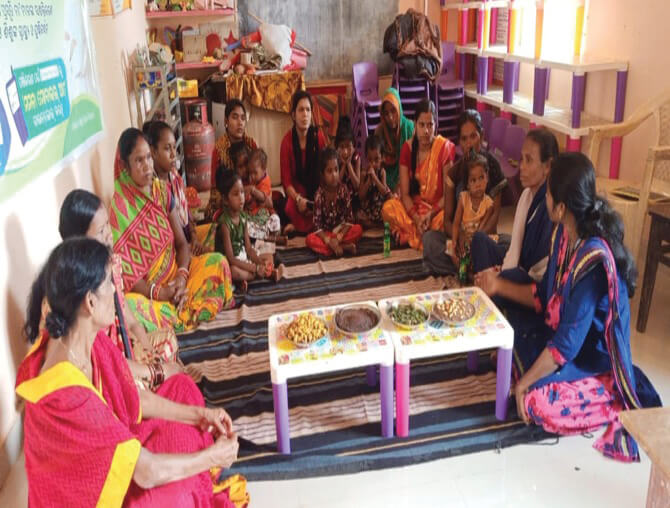Rayagada district comprises 11 blocks, Muniguda being one of them. The block consists of 17 Gram Panchayats spread over 404 villages. Among those,125 villages in 10 Panchayats are difficult-to-reach areas.
The ICDS project in Muniguda comprises seven sectors having 187 Anganwadi Centres (AWCs) (Main-139 and Mini-38) but only 139 Village Health, Sanitation and Nutrition Day (VHSND) points.
There is one Community Health Center (CHC), four Public Health Centers (PHCs), four Health centres and 23 Sub-centres for providing healthcare services in the block. Ninety-five villages have been declared ‘SAMPurNA villages’ by the Health Department of the Government of Odisha, and an additional 30 villages have been identified by Harsha Trust as ‘Hard-To-Reach areas’.

SAMMPurNA (Sishu Abong Matru Mrutyu hara ra Purna Nirakarana Abhiyan)
A scheme launched by the Govt. of Odisha in the year 2017, aimed to ensure immunisation and reduce IMR and MMR by providing financial support of ₹1,000 to expectant mothers coming from areas where access to four-wheeler ambulance services is not available so that they can make their transport arrangements to reach the nearest public health facility for timely delivery. It lays special emphasis on vulnerable pockets in 15 tribal-dominated districts of Odisha.
Hard-To-Reach areas: Remote areas which lack ambulance facilities, are difficult to reach by four-wheelers, can be reached mostly by walking, are covered by dense forests, with poor network connectivity have been identified by Harsha Trust as ‘Hard-To-Reach areas’.
The Intervention
Harsha Trust is implementing the Nutrition and Health project in Muniguda block with support from the Azim Premji Foundation (APF) in collaboration with the ICDS and Health department to improve the nutritional status of children under five, pregnant and lactating women. The project period is from 1st September 2022 to 30th November 2023, starting with staff recruitment and capacity building programmes, followed by intervention.
Lower Penetration of Community Health Initiatives
Before the intervention of Harsha Trust, awareness and participation of women – especially mothers – regarding VHSND was very low. This led to a low participation of eligible women and children at the VHSND. This meant insufficient growth monitoring of children under the age of 5 years. This is especially true for hard-to-reach areas for which participation in VHSND was low because of both lack of awareness and accessibility.
Moreover, the community has unflinching trust in traditional healers/Jani/Disari’s treatment. So, people prefer primary treatment from their Jani/Disari in case of any illness and during pregnancy. There are villages where even ambulances cannot transport critical patients to the nearest health centre and SAM (Severe Acute Malnutrition) children and pregnant mothers for routine health check-ups.
The inaccessibility of health services in difficult terrains, limited faith in modern healthcare (viz. allopathy) and low awareness about health and nutrition-related entitlements and services among communities limit their ability to get timely health services, causing maternal and child mortalities.
Convergence for Streamlining Public Health
To regularise the VHSND and growth monitoring of children, Harsha Trust initiated the Block level launching of the project and regular meetings with ICDS and Health departments to build rapport, coordination and acceptance. Monthly updates have been submitted to the ICDS and Health department.
Supervisors and Poshan Saathis are continuously visiting and supporting the Front-Line Workers (FLWs) in VHSND and supporting them in Growth monitoring, Home Ration (THR) distribution, immunisation days and observation of relevant days and other activities in the field. Supervisors and Poshan Saathis are participating in the Sector meetings of ICDS.
The Programme Manager, CBO, and MIS team are also addressing the field-level difficulties with the support of AWl; Poshan Saathis informed the child’s parents to ensure regular growth monitoring, by which the nutritional status can be identified. Harsha Team members have worked with the ICDS functionaries, ASHA and ANM to organise the VHSND at a location closer to such areas.
They have also ensured that pregnant women and lactating mothers in the due do not receive Ante Natal Care and Post Natal Care. In March 2023, the Harsha Trust, Nutrition & Health project team prepared a plan with ICDS supervisors and AWWs to observe the ‘Ojan Utsav’ to ensure 100% growth monitoring of children under the age of five.
Quick Response Team (QRT)
The induction of the “Quick Response Team (QRT)” is a unique initiative of the Harsha Trust-APF Nutrition and Health project. The basic role of QRT is to provide immediate emergency health services to SAM/ ill children and High-Risk Pregnant women (HRP) through proper counselling and transportation so that they can be treated quickly and chances of mortality can be reduced.
QRT also does follow-up visits and takes necessary steps to monitor and address the health condition. One four-wheeler vehicle has been provided to QRT, dedicated to transporting SAM children and HRP for health check-ups.
The team started working in January 2023. The QRT consists of a Nutrition Counsellor and an ANM. After the identification of a Severely Acute Malnutrition (SAM) child in Growth measurement and a High-Risk Pregnant mother (HRP) in the VHSND, the information comes from Poshan Saathis and Supervisors to the QRT through MIS.
QRT prepares the visit plan with guidance and support of the Programme Coordinator, Programme Manager and MIS team every week and shares it with Supervisors accordingly for accessing the support from Poshan Saathis, AWC/ASHA/ANM/PRIs during counselling and transportation to medical facility for health check-ups.
QRT conducts both individual and group counselling through picture cards and telling case stories with the support of Frontline Workers and PRI members. QRT conducts awareness and counselling sessions on the necessity of health check-ups, sanitation & hygiene, feeding frequency, quality and quantity of feeding, etc.
A visiting card has been developed for the QRT and shared with the community, by which HRP women and parents of SAM children can communicate with QRT as and when in need. The review of progress is done regularly, encouraging the QRT to continue with their best efforts.
Results – Post Intervention
The child growth monitoring in the Presence of Poshan Saathi at the VHSND gradually increased from 62% in January 2023 to 74% in February 2023 and 90% in March 2023. The ANC & PNC health check-ups have also increased to 90% with the support of Poshan Saathis. Regular and appropriate awareness-building activities have enhanced participation in VHSND.
Also, with the support and active efforts of ICDS and Health functionaries, VHSND has been regularised in 7 points such as Gunjapai, Dhandra, Melchua, Alishavatta, Palkapada, Kudubaru, and Serubaru w, here the services were earlier being given at other points. Further, growth monitoring has been regularised in 29 AWCs. Involvement of the child’s parents, PRI members and other village-level institutions in growth monitoring and VHSND is crucial to regularise and sustain it.


The QRT reached 65% to 70% of SAM children and HRP women in March 2023. QRT has done 1st-time visits and counselled 189 SAM children and done 2nd-time visits to 107 SAM children out of 189 children by March 2023. QRT has referred 44 children to PHC, 60 children to CHC, five children to DHH and 12 children to the Nutrition Rehabilitation Centre (NRC), Rayagada, for health check-ups.
At the same time, QRT visited and did 1st time counselling for 177 High-Risk Pregnancy women and 2nd time counselling for 55 High-Risk Pregnancy women. The team also referred 34 HRPs to PHC, 75 HRP to CHC and 2 HRP to DHH for ante-natal check-up for safe delivery.
Inspiring Journey of Budhubari Jakesika
Earlier, mothers used to rely on local midwives and opted for home deliveries of infants, as they firmly believed that any pregnant woman who crossed beyond the limits of the village deity for delivering her child would be cursed to have a stillbirth.
Through regular nutrition counselling and awareness programmes by our Supervisor, Poshan Sathi, Nutrition Counsellor and ANM (QRT) in collaboration with govt. ANM, ASHA, AWW and ICDS Supervisor, a slow yet gradual shift towards VHSNDs happening in the same village and institutional deliveries has been seen.
A case in point can be Budhubari Jakesika, who belongs to a SAMPurNA village which is on undulating land, inaccessible by ambulance and 20 km away from CHC Muniguda. With support from professionals and a QRT vehicle, she could avail free of cost antenatal check-up under the Pradhan Mantri Surakshit Matritva Abhiyan (PM SMA) and delivered a healthy child at CHC, Muniguda and both were duly immunised.
Major challenges
- Building rapport and collaborating with different stakeholders took time to achieve.
- In hard-to-reach areas, QRT cannot cover 100% of planned visits in the same month.
- At times, QRT cannot meet the family members in case of their unavailability at home during the QRT visit.
- The community is requested to provide lunch during QRT visits because the team works throughout the day for the health check-up.
- Language is a barrier to spreading awareness and counselling in the interior PVTG villages.
Way Forward
- QRT can reach the hard-to-reach areas to provide immediate service.
- The support of FLWs and PRI members for facilitating counselling and referral has increased.
- Community acceptance has increased due to the service of QRT, by which referral services are expected to increase and seeking treatment from traditional healers/Jani/Disari is expected to gradually decrease, with convergence, coordination and support of stakeholders.
